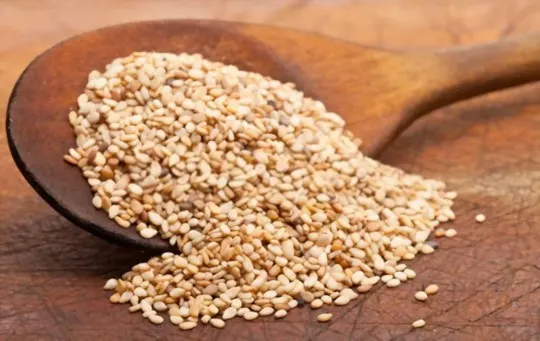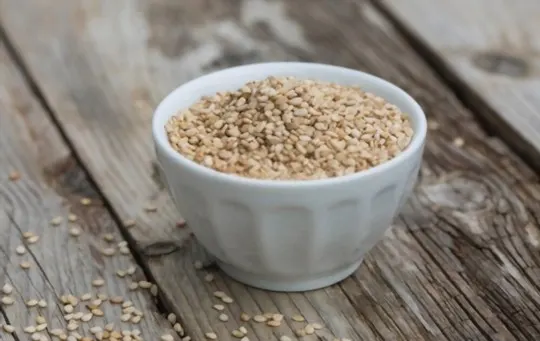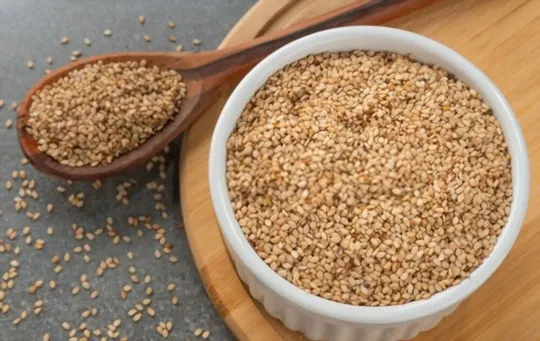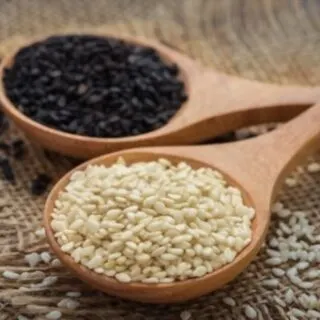If you’re an avid baker, chances are you’ve seen or used sesame seeds in a recipe at least once.
But have you ever wondered how long these tiny crunchy little buddies last?
How can they be stored in order to keep them edible?
Do they go bad after a certain period of time?
If so, what’s the best way to tell if they are still good enough for your next baking project?
These might seem like tricky questions that require you to do some research, but we’re here to answer all of them!
In this blog post, we’ll look into the shelf life and storage tips for sesame seeds so that even beginner bakers can rest assured when using these flavor-packed ingredients in their recipes.
So read on and find out how long those sesame seeds will last!
What is Sesame Seed?

Sesame seeds are the edible seeds of the sesame plant.
The scientific name for the sesame plant is Sesamum indicum.
Sesame seeds are small, oval-shaped seeds that have a nutty flavor and a slightly crunchy texture.
They are available in a variety of colors, including white, black, brown and red.
Sesame seeds are a good source of essential nutrients, including protein, fiber, vitamins and minerals.
They also contain antioxidants that can help protect your cells from damage.
Additionally, sesame seeds contain phytochemicals that may boost your health in various ways.
For example, sesamin, a type of phytochemical found in sesame seeds, has been shown to protect against liver damage.
While most people associate sesame seeds with savory dishes, they can also be used in sweet recipes.
For example, sesame seeds can be used to make cookies, cakes and other desserts.
How to Store Sesame Seeds?
Sesame seeds can be stored in a number of ways.
The most important thing to remember is to keep them in a cool, dry place.
This will help to prolong their shelf life.
One way to store sesame seeds is in an airtight container.
This will keep them fresh and prevent them from absorbing any moisture or odors from the surrounding environment.
Another option is to seal them in a zip-top bag.
If you do this, be sure to squeeze all the air out of the bag before sealing it.
You can also store sesame seeds in the freezer.
This is a good option if you want to keep them for an extended period of time.
Just be sure to thaw them before using so that they don’t clump together.
No matter how you choose to store them, be sure to check on your sesame seeds regularly and discard any that have gone bad.
How Long Do Sesame Seeds Last?

Sesame seeds are one of the oldest spices known to man and have been used in various cuisines for centuries.
These tiny, nutty-tasting seeds come from the sesame plant, which is native to Africa and Asia.
Sesame seeds are available throughout the year and can be bought either whole or ground.
So, how long do sesame seeds last? When stored properly, whole sesame seeds can last for up to 2 years, while ground sesame powder can last for 6 months.
Sesame seeds go bad when they are exposed to light, heat or moisture.
If any of these three factors accelerate the rancidity process, then the quality and flavor of the sesame seeds will deteriorate much faster.
To extend the shelf life of your sesame seeds, it is best to store them in an airtight container in a cool, dark place like the pantry.
You can also keep them in the fridge if you want them to last even longer.
Whole sesame seeds can also be frozen for up to 1 year.
How to Tell If Sesame Seeds are Bad?

It’s easy to tell if sesame seeds are bad – they’ll have a sour, rancid smell.
If they smell off, it’s best to discard them.
Additionally, sesame seeds that are starting to go bad will be discolored, often with a grayish tint.
If your sesame seeds are starting to turn, it’s best to toss them and get fresh ones.
Sesame seeds that have gone bad will not taste good either.
They’ll have a sour, bitter flavor that is unpleasant to eat.
If your sesame seeds taste funny, it’s best to discard them.
Generally speaking, sesame seeds will last for several months when stored properly.
However, once they start to go bad, they’ll spoil quickly.
So if you’re not sure whether your sesame seeds are still good, it’s always better to err on the side of caution and throw them out.
Can You Freeze Sesame Seeds?
Yes, you can freeze sesame seeds.
In fact, freezing them is a great way to preserve their freshness and flavor.
Seeds are small and have a high surface area, so they tend to go bad quickly.
Freezing them will help them last longer.
To freeze sesame seeds, simply spread them in a single layer on a baking sheet and place them in the freezer.
Once they’re frozen, transfer them to an airtight container or zip-top bag.
Frozen sesame seeds will last for about six months.
When you’re ready to use them, thaw the seeds at room temperature or in the refrigerator.
You can then use them as you would fresh sesame seeds.
Add them to stir-fries, sprinkle them on top of salads or soup, or use them to make your own sesame paste or tahini.
Conclusion
In short, sesame seeds can go bad, but they have a pretty long shelf life.
To extend their shelf life, store them in an airtight container in a cool, dry place.
You can tell if they’ve gone bad if they smell rancid or have changed in color.
If you’re not sure, it’s always better to err on the side of caution and discard them.
Sesame seeds can be frozen, but it’s not necessary.

How Long Do Sesame Seeds Last? Do They Go Bad?
Ingredients
- Sesame seeds
- Air-tight containers or Ziplock bags
- Labels and markers
Instructions
- Store your product in an labelled container in a cool, dark place like the pantry or fridge.
- If your food is frozen, allow it to thaw in the fridge before cooking.
- Make sure to look for signs that your food has gone bad before eating it.

Carrie is a food writer and editor with more than 15 years of experience. She has worked for some of the biggest names in the food industry, including Bon Appétit, Food & Wine, and Martha Stewart Living.
As the Editor in Chief of IntroChicago.com, Carrie oversees all of the content on the site. She also manages the team of contributing writers and editors, who help to create delicious recipes, helpful tips, and informative articles that you’ll find on the site.
A native of the Chicago area, Carrie is passionate about all things food. She loves trying new restaurants and experimenting with new recipes in her kitchen. She’s also a graduate of the Culinary Institute of America, so she knows a thing or two about food!
